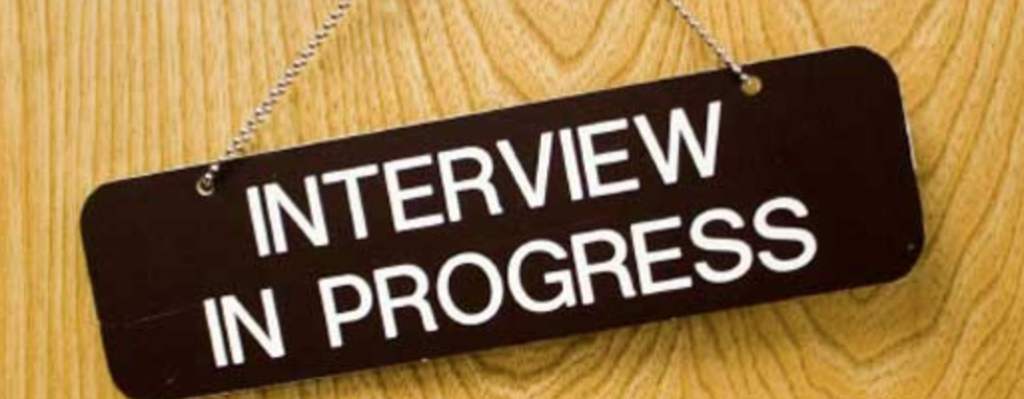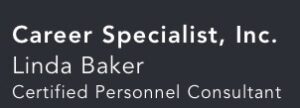Preparing For An Interview

Sometimes it’s good to get a reminder of how to prepare for an interview. Feel free to browse the following interview tips on how to prepare for your next interview.
PDF Download of Interview Tips
Always do your research before your interview. You would not buy a house without examining it thoroughly, nor should you attend an interview without a good knowledge of the bank and of the position for which you are being interviewed. Applicants who know nothing of the bank or the position for which they are being interviewed do not impress interviewers.
- I will advise you of the time and place of the interview, and of the interviewer’s identity and position. I will also describe the bank, its growth patterns, and potential for career growth.
- You should also consult other sources. The public library offers many sources in addition to Dun & Bradstreet’s Reference Book, annual reports, newspaper and magazine clippings.
- Keep in mind that the purpose of an interview is not only to decide whether or not you possess the qualifications the interviewer seeks, it is also your opportunity to decide if this bank has the growth opportunity and career path that you want. Therefore, you should prepare a list of questions that you feel will help you evaluate the bank and position. such as: What are your plans for the bank and where do you see the bank in 2-3 years?
- Are there training programs available?
- Based on good performance, where do you see this position leading in the next 2-3 years?
- What is the job’s relationship to other departments?
** Avoid asking questions about salary and benefits. You should not bring these up on a first interview.
Self Evaluation
The employer is looking for certain intangible assets. Think back to your last job for a moment. Can you recall someone with fewer skills, less professionalism, and less dedication who somehow leveraged his or her career into a position of superiority to you? He or she was able to do that only by cleverly projecting a series of personality traits that are universally sought by all successful companies. Building those key traits into your answers to the interviewer’s questions will win you any job and set the stage for your career growth at the new bank
Universally Admired Key Personality Traits
Personal:
- Drive: A desire to get things done. Goal-oriented.
- Motivation: Enthusiasm and a willingness to ask questions. Banks realize that a motivated person accepts added challenges and does that little bit extra on every job.
- Communication Skills: The ability to talk and write effectively to people at all levels in the bank is a key to success.
- Chemistry: Confidence, without self-importance, gets along with others, a team player.
- Energy: Someone who always gives that extra effort in the little things as well as important matters.
- Determination: Someone who does not back off when a problem or situation gets tough.
- Confidence: Not a braggart; poise, friendly, honest, and open to employees high and low.
Professional:
- Reliability: Following up on yourself, not relying on anyone else to ensure the job is well done, and keeping management informed every step of the way.
- Honesty/Integrity: Taking responsibility for your actions, both good and bad. Always making decisions in the best interest of the bank, never on whim or personal preferences.
- Pride: Pride in a job well done. Making sure the job is done to the best of your ability.
- Dedication: Whatever it takes to see a job through to completion, on deadline.
- Analytical Skills: Weighing the pros and cons. The short term and long term benefits of a solution against all its possible negatives.
- Listening Skills: Listening and understanding, as opposed to waiting your turn to speak.
*NOTE: The above section was excerpted from KNOCK ‘EM DEAD With Great Answers to Tough Interviewing Questions, by Martin Yate. It is highly recommended for more in-depth interviewing information.
What are your strong personal characteristics? What are your accomplishments and achievements in previous employment, in school, in the community? Evaluate yourself in terms of the position you are applying for. Write them down and then commit them to memory so they will come easily during an interview. What is outstanding about you? Why should that person hire you? What can you contribute?
Delivery
You are the merchandise. Wear proper business attire. First impressions are important. Arrive at the location approximately 15 minutes before the designated time. Review your notes outside in your car. Check your appearance. No gum chewing. Take an extra résumé and list of references with you. Then, go in with confidence!
The Interview
If you are asked to complete an application form, do so thoroughly – “See Résumé” is not acceptable. Greet the interviewer by name in a warm, friendly manner, with a smile and a firm handshake. Mirror their personality. If they talk slow, follow by talking slowly. If they are fast-paced, pick up speed. Conduct yourself with confidence and determination to get the job. Don’t play coy. Sell, sell, and sell yourself. Let the bank know what type of employee you will make when they hire you. Let them know your strengths, accomplishments and achievements. This is your first meeting and the position as well as future promotions may depend on your presentation now. Be enthusiastic. You are a salesperson and so is your interviewer. Sell them on the idea of hiring you. If you can do the job – tell them. If you want the job – tell them.
If a salary figure is asked for, let them know you are more interested in opportunity, future, and challenge with their bank, than the starting salary – try to remain OPEN. You are confident they will make a fair offer and you will consider their best offer. Don’t ever turn down an offer made on the spot.
Closing the Interview
- If you are interested in the position, ask for it. Ask for the next interview if the situation demands it. If the interviewer offers the position to you, and you want it, accept on the spot. If you need some time to think it over, be courteous and tactful in asking for that time. Set a definite date by which you can provide an answer.
- Don’t be discouraged if no definite offer is made or specific salary discussed. The interviewer will probably want to interview more applicants before making a decision.
- If you get the impression that the interview is not going well and that you have already been rejected, don’t let your discouragement show. Once in a while, an interviewer who is genuinely interested in you may seem to discourage you in order to test your reactions under pressure.
- Make a positive closing statement. “I appreciate the time you’ve spent with me today and based on what you’ve shared with me about your company, I’m looking forward to becoming part of your team.” If you have answered the two questions uppermost in the interviewer’s mind: “Why are you interested in our bank?” and “What can you offer?”
- If the interviewer gives you an application to complete, or if you’re asked to send supplemental information, do this as quickly as possible. This is often a test to determine the degree of interest and the promptness of the potential employee.
Evaluating the Interview
The Follow-Up
Send a courtesy “thank you” note even when you are not interested or qualified for the job. This is a small marketplace and you never know when your paths will cross again. Express your thanks for their time, informing the interviewer of your feelings. If you are still interested in the company and would like to be considered for other positions, which are more suitable, let the company know in case such positions arise.
Use your energy in a creative follow-up effort when there is a high probability of receiving an offer for the job you want.
Send a follow-up note/letter including some of the following points:
- Express your interest.
- Show positive matches between what they want and what you have to offer.
- Refer to previous related experience.
- Volunteer further information.
- Offer to give references.
- Ask for clarification on an issue.
Note: These guidelines are suggestions only. Use your judgment and creativity when writing your note/letter.
Member ~ The Society for Human Resource Management
Associate Member ~ Oklahoma Bankers Association
